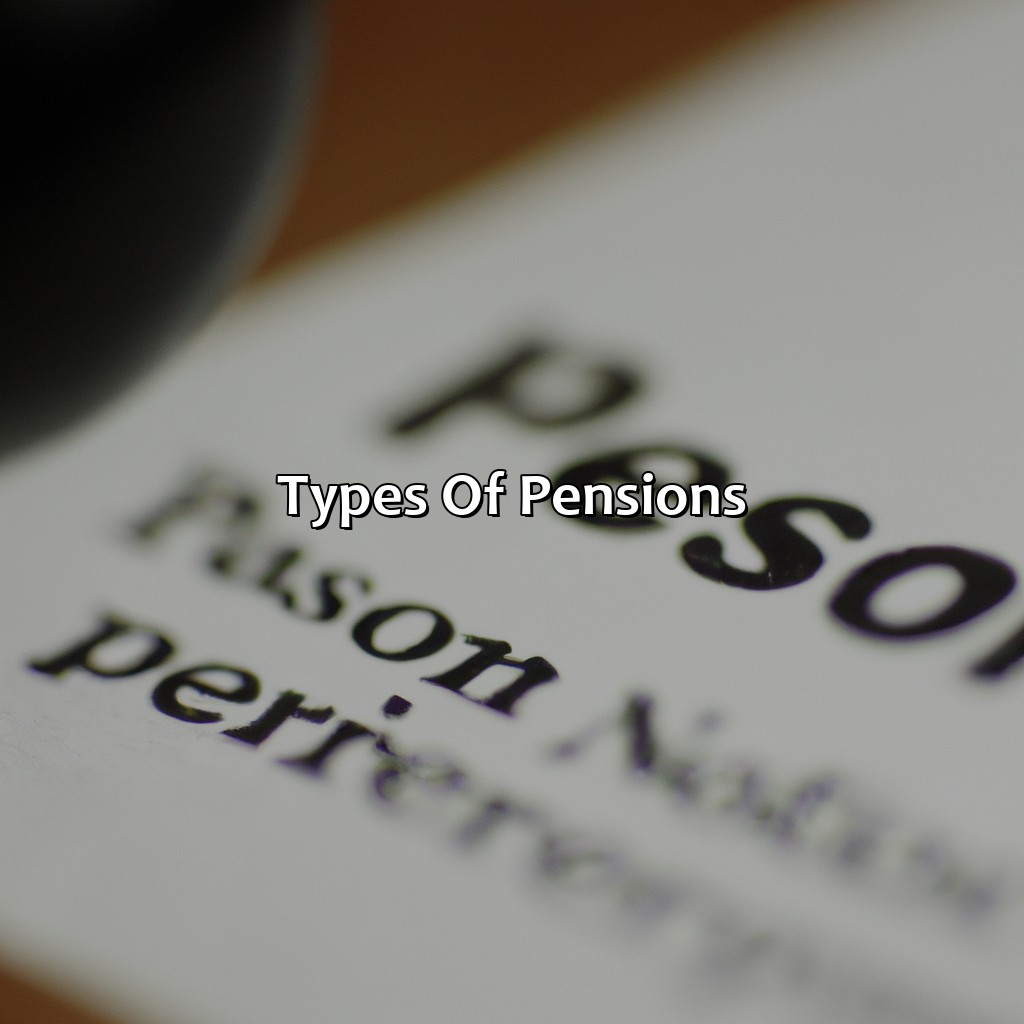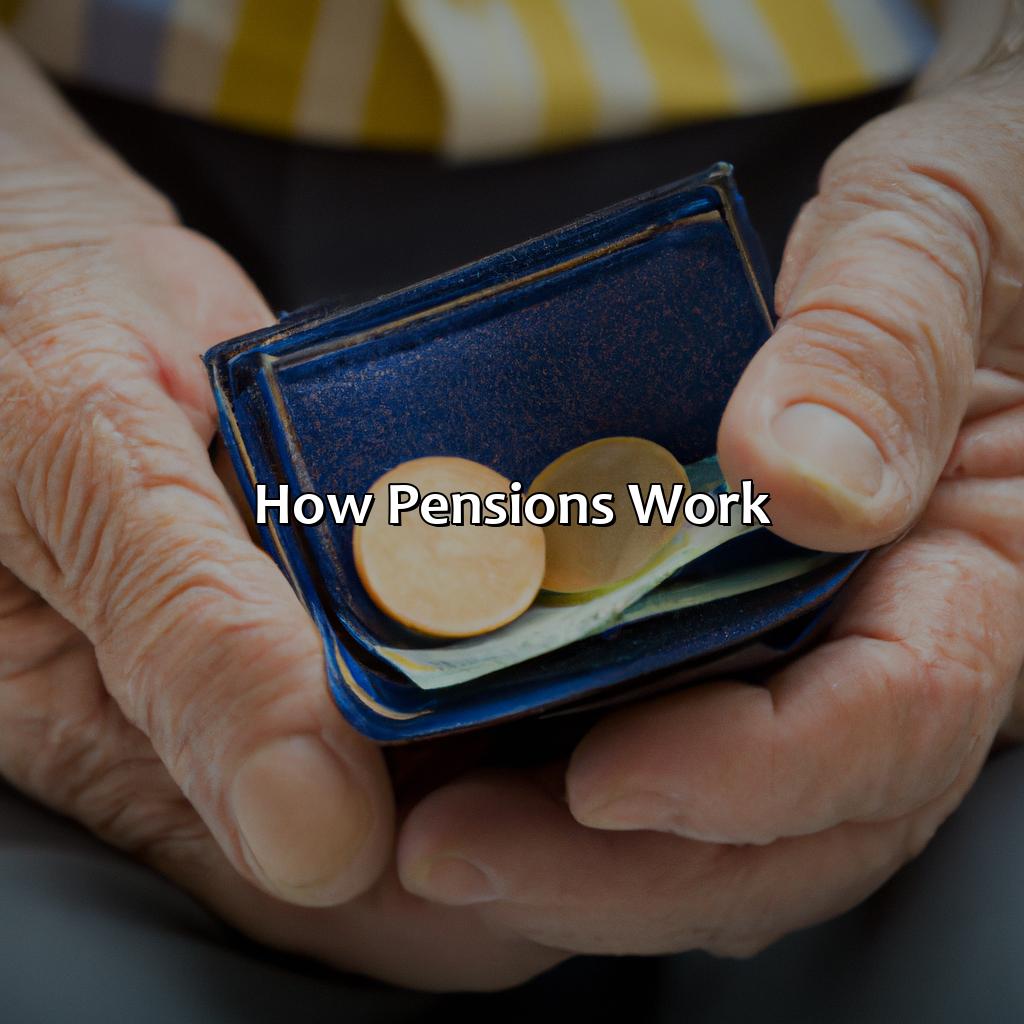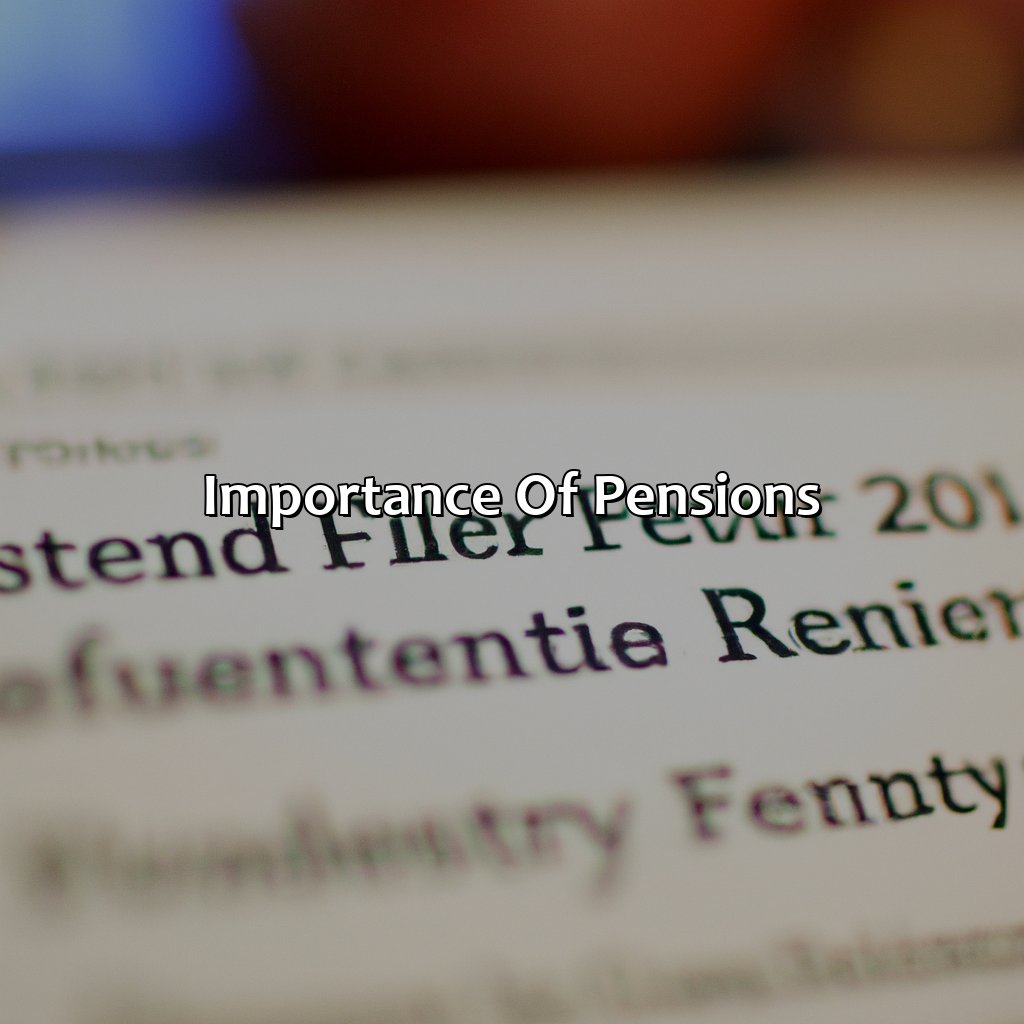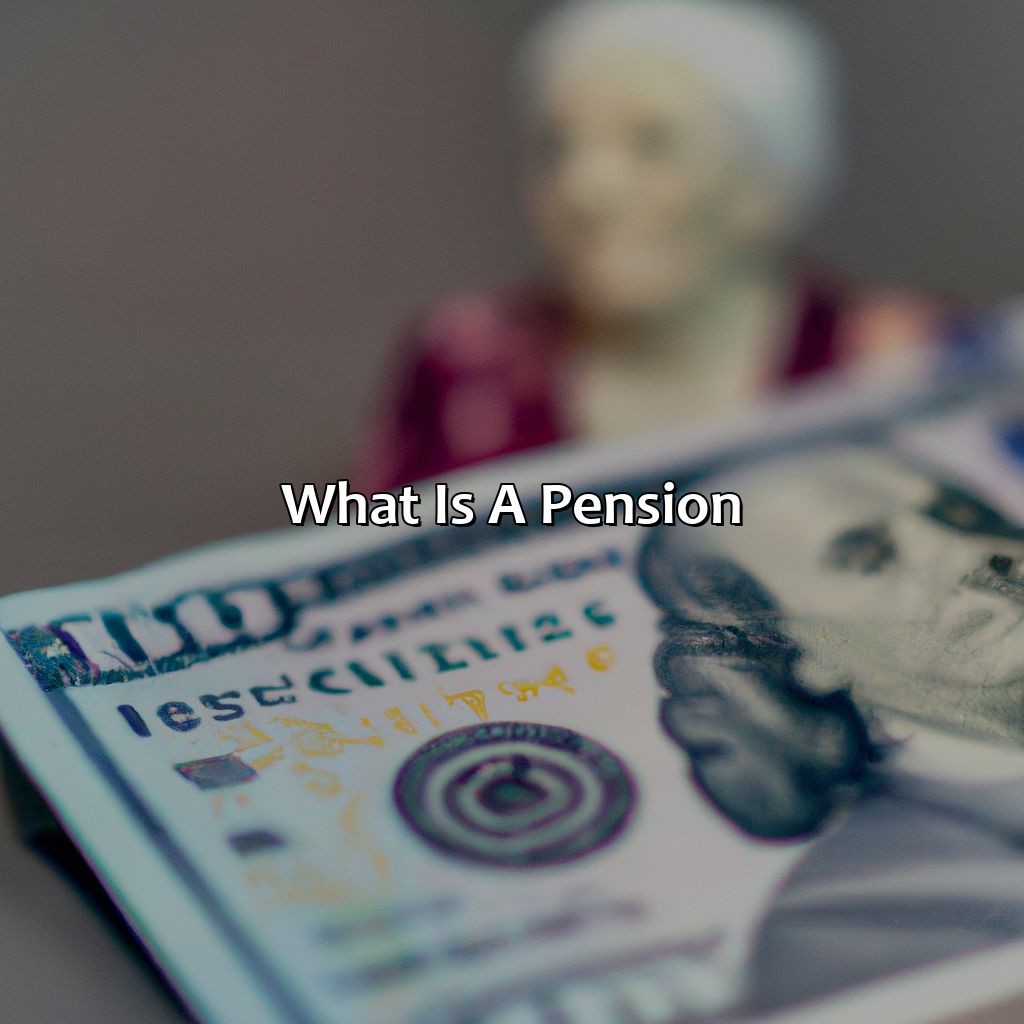What Is A Pension?
Key Takeaway:
- A pension is a retirement savings plan that provides a regular income to retirees. It is typically funded by contributions from both the employer and employee.
- There are three main types of pension plans: defined benefit, defined contribution, and state pension. Defined benefit plans guarantee a certain amount of income, while defined contribution plans rely on investment returns. State pensions are funded and administered by the government.
- Pensions work by investing contributions and using the earnings to pay out benefits to retirees. Eligibility and enrollment, contributions and funding, and the distribution of benefits are all key factors in how pensions operate.
- Pensions are important for retirement planning, providing financial security, and offering tax benefits. They can be a critical source of income for retirees, especially those without other sources of retirement savings.
- However, pensions also come with challenges and risks, such as funding shortages, market volatility, and the risk of outliving retirement savings. It is important for individuals to understand these risks and plan accordingly.
Are you confused by pension terms and options? Don’t worry, you’re not alone! This article is designed to help you understand the basics of pensions and the key considerations for making the right choice. So, take a deep breath, and let’s dive into the world of pensions.
Definition of Pension
Pensions are financial plans designed to provide individuals with a steady income after retirement. They are essentially a way to save money while working to safeguard one’s future by providing a reliable source of income during their post-retirement years. Pensions can be funded by the individual, their employer or a combination of both.
Pension plans can come in different types, including:
- Defined benefit plans offer guaranteed payouts
- Defined contribution plans focus on the contributions made to the plan
- Hybrid plans combine features of both defined benefit and defined contribution plans
It’s important to start saving for your pension early to take full advantage of compound interest and to ensure a comfortable retirement.
To ensure financial stability after retirement, it’s imperative to consider various options and make sound investment decisions. By setting financial goals and understanding the different types of pension plans available, individuals can make informed decisions to ensure a secure future. Don’t let the fear of missing out on a financially secure retirement push you into making hasty decisions. Take the time to understand the different retirement options available and plan accordingly. A proper pension plan can help you retire in style without worrying about finances. Start planning today for a secure tomorrow.

Image credits: retiregenz.com by Harry Arnold
Types of Pensions
To grasp the various kinds of pensions, plunge into this part’s subsections on Types of Pensions. These include Defined Benefit Pension Plan, Defined Contribution Pension Plan and State Pension. Each plan offers a one-of-a-kind solution for retirement savings and benefits.

Image credits: retiregenz.com by David Washington
Defined Benefit Pension Plan
A pension plan where an employee is paid a fixed amount of money after retirement based on salary and years of service is known as a Guaranteed Retirement Income Plan. This plan guarantees employees a specific payout regardless of the investment return. The employer contributes to the pension fund, and the risk lies with them in maintaining enough funds to pay for all future accrued benefits.
The advantage of this plan is that the employee knows exactly how much they will receive post-retirement, making financial planning easier. Additionally, it encourages employee retention by providing a benefit that employees may not receive elsewhere. On the other hand, if investment returns fall short or life expectancy increases, it can lead to underfunding issues.
It s important to note that not all employers offer these types of pensions, and they are becoming less common due to rising costs. However, if your employer does offer this plan, it s worth considering as part of your retirement strategy.
Don t miss out on the opportunity to secure a consistent income in retirement with a guaranteed retirement income plan. Check with your employer about their available pension options and make an informed decision for your future financial stability.
Your retirement savings are determined by your investment choices, so choose wisely – because you wouldn’t want to end up with a pension that’s worth less than a winning lottery ticket that expired yesterday.
Defined Contribution Pension Plan
A Defined Contribution Pension is a retirement plan where the employer and employee contribute a set amount into an investment account. These contributions are invested, and the future benefits of the pension plan depend on investment returns. The amount in a Defined Contribution Pension Plan can fluctuate, based on the performance of the investments.
One significant benefit of this type of pension plan is that it allows employees to monitor their investments’ progress and adjust their contributions accordingly. An employee’s final payout from this type of pension plan depends on the contributions made, how well those contributions were invested, and other factors like taxation rules.
It’s essential to note that while employers may offer guidance and assistance in choosing investments for a defined contribution pension plan, they do not guarantee any returns or benefits. Hence, employees carry more responsibility for their retirement outcomes.
A piece of beneficial advice for individuals with a defined contribution pension would be to regularly monitor their investments’ performance and considering professional advice when making changes to their portfolio.
Getting excited about the State Pension is like getting excited about receiving spam mail – it’s not exactly a thrilling prospect.
State Pension
The State Pension, a government initiative, is a regular payment made to individuals of the state for their retirement. The eligibility age and amount depend on one’s NI contributions. The pension may be augmented based on Additional State Pension, Pension Credit or Savings Credit claimed.
The State Pension comes with exclusive benefits like free travel passes, winter fuel payments and the option of deferring payments for additional amount. As NI contributions are mandatory for most working adults, this pension plan offers an organized retirement benefit.
It is important to keep track of your NI record as it determines if you get full state pension or not. With the recent changes in regulations, it s essential to evaluate your options through the gov.uk website before you retire. Understanding what is the pension plan and how it works can also help you plan for retirement.
The State Pension is among the few fair and secure ways to help citizens fund their retirement years in the United Kingdom. (Source: Gov.uk)
Get ready for a crash course in pension math – because your golden years aren’t going to fund themselves.
How Pensions Work
Do you know how pensions work? You need to! They are financial plans that help you save money for retirement. Let’s dive in and learn about:
- eligibility and enrollment
- contributions and funding
- the distribution of benefits
Pensions are solutions for when you no longer work and need money for retirement.

Image credits: retiregenz.com by David Woodhock
Eligibility and Enrollment
To begin with, meeting the requirements for participation in a pension scheme is imperative. Every individual has to satisfy the eligibility criteria and undergo enrollment to avail of this measure.
Eligibility and Enrollment are essential processes that must be conducted, and adherence to them can guarantee retirees financial stability. Criteria such as age, years of service are taken into account while determining eligibility. As for enrollment, information like personal details, income, and future plans have to be furnished.
It is imperative to note that in some instances, employers administer these schemes on behalf of employees. The employer’s role is not merely administrative but also educational; they provide information about all available options so that employees can choose the most suitable one.
Sharing an anecdote of someone who didn’t take up advantage of their eligible pension funds could help drive the message home. Despite requiring financial support after retirement post its expiration date lapsed six months was left with severely depleted savings accounts.
Saving for retirement is like investing in a good pair of shoes, you may not appreciate it now but your future self will thank you for the support.
Contributions and Funding
The process of contributing towards and funding a pension requires understanding the different types of plans available, such as defined benefit or defined contribution plans. Each plan has its unique features and requirements for contributions, with some employers also matching employee contributions.
In addition to employer and employee contributions, pensions may also receive funding from investment earnings on the pension fund’s assets. As the fund grows over time, it allows for greater retirement benefits.
Pro Tip: Understanding the options for contributing towards and funding your pension is crucial for building a stable retirement plan. Make sure to consult a financial advisor to ensure you are making informed decisions for your future.
Retirement: when you stop working just for the money and start working on your golf swing instead.
Distribution of Benefits
Pension Distribution of Benefits refers to the process of allocating pension benefits to beneficiaries. Here are some key points about the distribution of pension benefits:
- Beneficiaries may receive a lump-sum payment or periodic payments, depending on the terms of the pension plan.
- The amount of benefits received is based on factors such as years of service and salary level at retirement.
- Benefits may be distributed immediately upon retirement or at a later date, depending on the plan.
- If a beneficiary dies before all pension benefits have been distributed, there may be options for spousal or dependent continuation of payments.
It is important for beneficiaries to understand their options for receiving and managing pension benefits.
Understanding how pension plans work is crucial, and individuals should read and gather comprehensive information before making significant decisions about their finances. The appropriate usage of such plans can provide long-term income flow during old age. It might also assist a person in achieving a stable financial future.
To maximize benefit availabilities from Pension schemes, employees may consider various possibilities like seeking professional fiscal advice while selecting between Lump Sum payout and regular wage payment options. However, it’s recommended that any major decision regarding your Pension Plan should be carried out after thorough research.
Retirement plans are like life jackets, you may not need them now, but you’ll be glad you have one when the ship starts to sink – financially speaking.
Importance of Pensions
Grasping the immense part pensions take in guarding your future after retirement is essential. Pensions bring many advantages, like financial protection, retirement arranging, and tax benefits. They offer a profitable method for having a great post-work life. Let’s delve deeper into the significance of pensions and investigate these subsections.

Image credits: retiregenz.com by Yuval Woodhock
Retirement Planning
Retirement planning involves anticipating future financial needs and developing strategies to ensure sufficient savings or income sources. One important aspect of retirement planning is understanding and implementing pension plans, which provide regular income during retirement based on contributions made during working years. Pensions are beneficial as they reduce the financial burden on employees’ social security systems and allow for a comfortable retirement lifestyle.
Planning early for retirement, taking advantage of employer-sponsored pensions, and considering supplementary investment options are essential for a successful retirement strategy. Pro Tip: Starting early with pension contributions allows for more significant growth and higher potential returns over time.
Financial security is like a unicorn – it’s elusive, mythical, and only exists in your dreams if you don’t plan for retirement.
Financial Security
Achieving economic steadiness is an essential aspect of life that everyone should strive for. One way to achieve this is through the Semantic NLP variation of financial security – ensuring that one has ample finances to cater for their needs as they age. Pensions offer this kind of financial stability.
Pensions are a financial plan that safeguards your post-retirement future by providing you with a steady income stream and covering your medical expenses. It is where you set aside a portion of your earnings/wages every month and invest it in diverse ventures to increase its value, before it is returned to you as monthly payments upon retirement. If you want to learn more about pension expense, check out this helpful article.
Unlike other savings plans or investments, pensions tend to be more tax-efficient and have higher contribution limits and annual allowances; hence they provide greater ease of accumulation compared to other individual retirement accounts.
Notably, pensions have various types, including defined benefit (DB), defined contribution (DC) schemes, hybrid plans like cash balance plans, among others. Each pension type operates on different principles hence the need to choose the right scheme that best achieves your personal goals.
For instance; my grandmother suffered debilitating ailments before her eventual passed away; however, since she had been on a well-maintained pension plan throughout her life, she never lacked proper hospital care or struggled financially despite not having dependent children or relatives.
Don’t worry about retirement, just focus on getting enough deductions for that sweet tax break.
Tax Benefits
One of the significant advantages of maintaining a pension plan is tax efficiency. Pension contributions are usually made before taxes, decreasing an individual’s taxable income. Furthermore, pensions in some states also have other tax benefits like being exempt from state income taxes and potentially reducing estate taxes.
Employees with a pension plan may benefit more as their contributions typically decrease their income and therefore their annual tax bill. The retirement plan also provides tax deduction advantages to employers who can include these contributions when filing for business taxes.
It’s essential to note that the tax benefits vary depending on the type of pension scheme you opt for; defined contribution plans differ from defined benefit plans.
If you’re wondering what is pension funds, it’s a retirement plan that provides a fixed income to employees who have retired. The amount of income depends on a variety of factors such as the length of time an employee worked for a company and the type of plan they opted for.
In August 1954, U.S President Dwight D. Eisenhower signed into a law called The Internal Revenue Code’s 401(k) launched by Theodore Ted Benna in 1981. Since then, it has been known to provide considerable amounts of retirement savings relatively easily.
Retiring without a pension is like playing a game of Jenga with no bottom blocks – sooner or later, everything’s going to come crashing down.
Challenges and Risks
Understanding and managing pension challenges and risks? It’s key! You need to know about Funding Issues, Market Risk, and Longevity Risk. These sub-sections can give you the insight to handle your pension scheme in an efficient way. Get to know them!

Image credits: retiregenz.com by Yuval Woodhock
Funding Issues
Pension Financing Challenges
Pensions are funded through various mechanisms such as employer contributions, employee salary deductions, investment earnings, and government support. However, the funding of pensions poses several challenges that can impact future benefits, including market fluctuations and changing demographic trends.
The sources of pension financing are susceptible to risks such as underfunding due to insufficient contributions or poor investment performance. Additionally, the aging population will drive up pension demand in the coming years, leading to an increased burden on current contributors. To learn more about what a pension income is and how it works, visit our website.
It’s vital for individuals to understand these funding issues and plan accordingly for retirement. Pension beneficiaries should regularly review their accounts and contribute adequately to ensure they meet their financial needs upon retirement. Failing to plan could result in missed opportunities for securing a comfortable life after working years.
Market risk is like a rollercoaster ride, except you don’t get a fun souvenir photo at the end.
Market Risk
Investment Hazard
Investment hazard is a crucial risk when it comes to pensions. It refers to the possibility of losing money on investments due to market downturns or poor investment decisions. Pension funds invest in various asset classes like stocks, bonds, and real estate. These investments can be volatile and can quickly lead to losses in case of market changes. To learn more about where pension money comes from, visit this website.
To mitigate this risk, pension funds diversify their portfolios and invest across different sectors and regions. Some funds also hire investment managers who use various strategies to balance the portfolio’s risk and return profiles.
It’s worth noting that these measures don’t guarantee full protection against investment hazards. The only way to completely eliminate such risks is by investing in low-risk assets with relatively low returns.
Example: A retired couple invested their entire savings into a pension plan that made risky investments in high-risk equities. One year later, the stock market crashed, resulting in significant losses for their pension fund, leaving them with very little money for their retirement years.
Longevity Risk
The risk of outliving a pension plan is a significant concern, commonly known as the Life Expectancy Risk. People are living longer, and it can be challenging to save enough money for retirement that will last throughout their lifespan.
Aged individuals require retirement savings to last approximately three decades; thus, the risk of exhausting their nest egg due to increasing longevity and inflation is higher than ever before. This specific risk is termed the Longevity Risk.
Retirees must have enough funds for their future without incurring depleted resources while they are still alive. Mitigating this issue requires proper planning and investment in suitable products that can provide stable income flows throughout retirement. Learn more about what the pension supplement is and how it can help secure your retirement.
It’s imperative to consider annuities that could reduce the impact of such a situation on people’s savings as they allow you to purchase an income stream with your accumulated assets allowing you to acquire guaranteed payments until death, regardless of how long you live.
Five Facts About What Is a Pension:
- ✅ A pension is a retirement plan that provides a steady income during retirement. (Source: Investopedia)
- ✅ Pensions are typically offered by employers as part of an employee benefits package. (Source: The Balance)
- ✅ Pension benefits are based on factors such as years of service and salary history. (Source: U.S. Department of Labor)
- ✅ Traditional pensions pay a fixed income for life, while defined contribution pensions such as 401(k)s allow retirees to withdraw from a savings plan. (Source: Forbes)
- ✅ Many pension plans are underfunded due to factors such as poor investment returns and longer life expectancies, raising concerns about their long-term sustainability. (Source: Bloomberg)
FAQs about What Is A Pension?
What is a pension?
A pension is a retirement savings plan where an employee or employer contributes a portion of their income into a fund that is then invested to provide income during retirement.
How do pensions work?
Pensions work by setting aside a sum of money on a regular basis, either by the employer, employee, or both, which is then invested in various securities to generate a return. At retirement age, the accumulated funds are used to provide a regular income stream to the retiree.
Who is eligible for a pension?
Pensions are typically offered by employers as part of a benefits package to their employees. However, some pensions are also available to individuals, such as individual retirement accounts (IRAs) or self-employed retirement plans. Eligibility may also depend on factors such as length of employment, age, and other requirements specified by the pension plan.
What are the different types of pensions?
There are several types of pensions, including defined benefit pension plans, defined contribution pension plans, cash balance pension plans, and hybrid pension plans, each with its own unique set of rules, regulations, and benefits.
What are some advantages of having a pension?
One advantage of having a pension is the security it provides in retirement, as it guarantees a fixed income stream for the rest of the retiree’s life. Additionally, pensions may offer tax benefits, employer matching contributions, and investment growth potential.
What are some disadvantages of having a pension?
One disadvantage of having a pension is that it may not keep up with inflation, particularly if it is a fixed-income pension. Additionally, some pensions may have strict eligibility requirements or limitations on when and how the funds can be withdrawn. Finally, pensions may be subject to economic downturns or changes to the pension plan’s rules and regulations.
